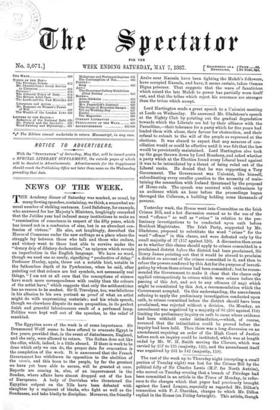The rest of the week up to Thursday night (excepting
a small portion of Tuesday night) was lost for the Crimes Bill by the political folly of Sir Charles Lewis (M.P. for North Antrim), who moved on Tuesday evening that a breach of Privilege had been committed in an article in the Times of Monday, in refer- ence to the charges which that paper had previously brought against the Land League, especially as regarded Mr. Dillon's connection with P. J. Sheridan, charges to which Mr. Dillon replied in the House (on Friday fortnight). This article, though it did not charge Mr. Dillon with deliberate falsehood, laid it down that his statements had been false, and that he might have known them to be false if he had taken common care ; and no doubt its general drift was to accuse Mr. Dillon of complete tin- trustworthiness, amounting to dishonourable laxity. Sir Charles Lewis moved that passages from the article be read by the Clerk, and then that the article was a breach of the privileges of the House. Mr. Dillon met the motion, which he treated as in intention a hostile one, coming as it did from Sir Charles Lewis, by expressing his perfect willingness to court inquiry, but sug- gesting that it would involve a great waste of time, and inti- mating that he was not then prepared with an answer to the Times' charges. In fact, he was understood to plead for delay, though he afterwards repudiated any such intention. Mr. W. H. Smith thought delay reasonable, both on Mr. Dillon's account and in order that the Government might have time to consider the question whether the Times' article should be treated as a breach of Privilege or not, and suggested that the debate should be adjourned. Mr. Dillon, at that stage of the matter, declared that if the article should not be decided to be a breach of Privilege, he had no wish to enter into any defence of himself against the Times. The First Lord of the Treasury accordingly moved the adjournment of the debate.



































